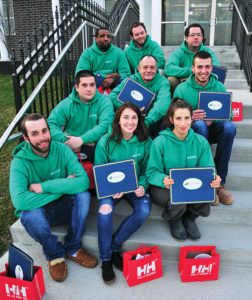The Workforce Crisis: Government funding builds local training programs

While many government training programs have been less than successful, the government can help address the workforce shortages by advocating for and utilizing funding – specifically on the state and local level.
The Rhode Island Marine Trades Association offers a pre-apprenticeship program, funded by Real Jobs Rhode Island, to help provide Rhode Island residents 18 and over earn skills needed for entry-level marine trades jobs, from carpentry to rigging, painting, composites, marine systems and more. This program includes a short-term internship and is built to funnel employees into local marine businesses.
Upon completion of the program, attendees understand the terminology and safety needs of the industry but will still need skills training. RIMTA’s goal is to connect employers to resources that can help them facilitate continued education for the apprentice.
“When we were designing the pre-apprenticeship training program, it was really with the intention of saying we’re going to create a person that can get to work as soon as they’re on the job, but we wanted to also connect these people and employers to ongoing funding,” said Wendy J. Mackie, CEO of Rhode Island Marine Trades Association & Composites Alliance.
“The graduates of this program are not going to be technicians right away, but these are entry-level workers starting their career in the industry and we’ve got a good number of employers who are willing to take these entry-level workers and train them,” added Jen Huber, vice president of operations at Rhode Island Marine Trades Association & Composites Alliance. “They know and understand that they still need a lot of training but what they can pretty much guarantee from us is that they’re going to show up and have a great work ethic, great attitude, willing to learn.”

Real Jobs Rhode Island is a combination of state and federal funds put together by the Department of Labor and Training in Rhode Island to respond to employer needs. This program helps fund the RIMTA pre-apprenticeship program and other offerings from the association.
“We happen to be very lucky that the Department of Labor and Training here understands the role that a trade association can play in being an intermediary type person to connect an employer to funding and services that are available from the state, but then also to be able to implement that training to respond to the employers’ needs,” said Mackie.
“Before Real Jobs was created two years ago, we would have to wait for certain requests for proposals to come out in order to bid for a specific training program,” added Huber. “Now with Real Jobs and now that we’re a Real Jobs partner, if a company comes up to us and says ‘we need to provide ABC trainings,’ we can reach out to the states and request funds and have them pretty much immediately, because now it’s based on what companies need, not what the state is prescribing.”
In Maryland, the Marine Trades Association of Maryland has launched a workforce development project called the Marine Trades Industry Partnership. The project is a collaboration between MTAM, Employment Advancement Right Now Maryland, and local employers, workforce development professionals and educators.
EARN Maryland is a state-funded, competitive workforce development grant program that aims to address business demands by focusing intensively on the workforce needs of a specific industry sector over a sustained period. MTAM applied for a planning grant, which allowed the association to write the grant for implementation, which is how the program has been funded twice so far.
“EARN Maryland sought out to be as flexible as they could be for different industries,” said Susan Zellers, executive director for MTAM. “I think Maryland set out to have a real employer-based grant where the employers dictated what this was going to be instead of the person that invented whatever it was that needed training on.”
MTIP consists of three training modules: summer practical training for engaging a younger workforce, incumbent worker/individualized group training and a Train the Trainer professional development series.
“Our goal is to give these employers a full-time employee at the end. Instead of training a school of kids and then [asking] what can they do next, we’re actually placing them – based on their applications and boot camp weekend that we provide to them – into a situation that we expect them to become a full-time employee of,” said Zellers.
What makes programs like these successful is the active partnership between marine trades associations and employers, bouncing ideas back and forth and communicating about what is or isn’t working. The first few pre-apprenticeship program cycles at RIMTA ended with employers providing constructive feedback about what they need.
“We find that it’s really effective because we already have the relationships with the employers and the employers have learned to trust us. When they say ‘I have this problem,’ they trust that we are going to address it in a way that will help them, and the employers here are also willing to work with us on figuring out exactly what does work and doesn’t work,” said Mackie.
Getting the funding for these programs is a big piece to the puzzle, and marine trades associations can work as advocates for the industry with the local and state government.
“What it’s really all boiled down to is educating the Department of Labor and Training of what your needs are. You hear all the time from NMMA or others about skills gap or the economic impact our industry has, and that sort of thing,” said Mackie. All the data that identifies the economic impact of the boating industry is what needs to be brought to DOLs, because those employees understand that information. “Any way that an association or group of employers can advocate their economic impact to the state or their region, the more strength they’re going to have to enable that type of funding to come into their hands.”
Advocating with and becoming members of local Chambers of Commerce helps improve that dialogue, said Captain Aaron Singh, waterfront director of the state-funded New York Harbor School.
“Those folks … are tasked with being able to create jobs and stimulate job growth,” he said. “We really need the local government to make it a priority to mandate and say this is something that is worthwhile.”
Mackie suggests a national career push from the industry – a Discover Boating for marine trades jobs, if you will. As much as small groups have been doing their part at the local level, a unified national effort that provides tools and idea samples of how to implement at a local or regional level would be beneficial resources for associations or employers starting from scratch.
“I really think that this industry could benefit from that and also tap into a significant amount of federal funds to be able to do something nationally,” she said.
Mackie and Huber are happy to help associations and employer groups in other states replicate RIMTA’s programs or provide insight for a national effort. To reach Mackie and Huber, contact wendy@rimta.org, jen@rimta.org or call 401-396-9619.




